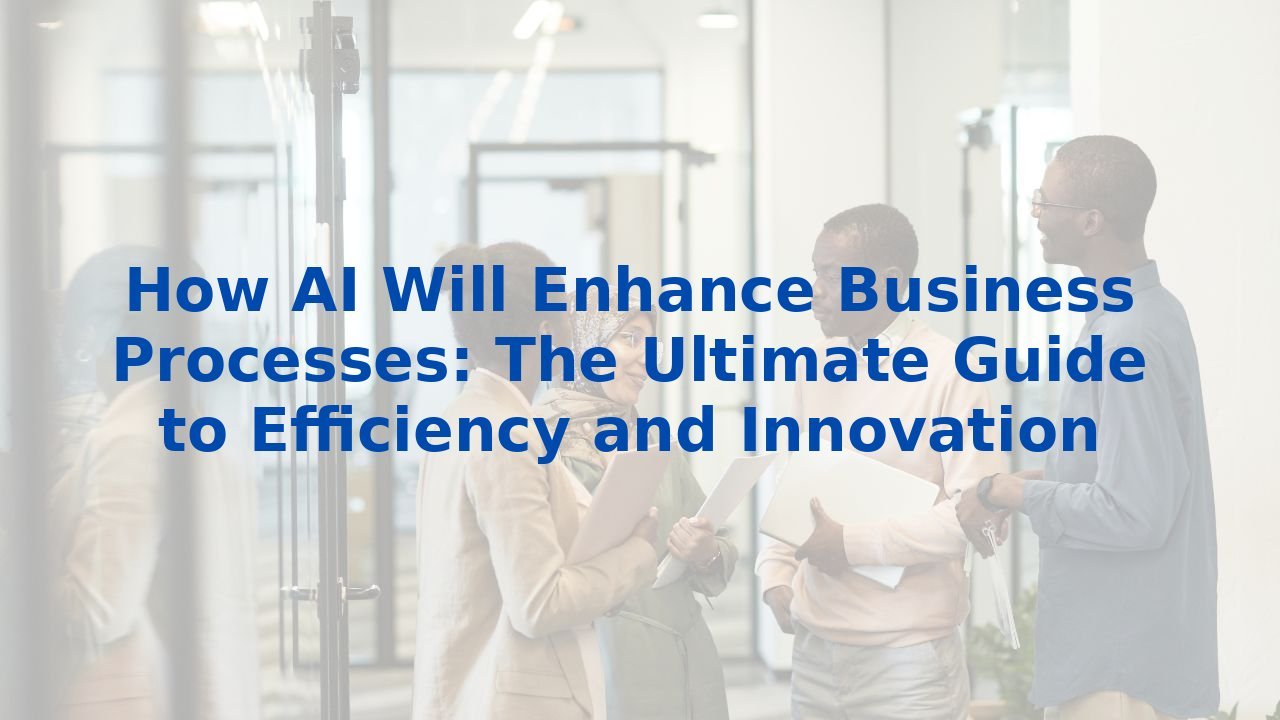How AI Will Enhance Business Processes: The Ultimate Guide to Efficiency and Innovation
How AI Will Enhance Business Processes: The Ultimate Guide to Efficiency and Innovation
Introduction
The integration of Artificial Intelligence (AI) into business processes is not just a trend; it's a revolutionary shift that is redefining how organizations operate. From automating mundane tasks to providing deep insights for better decision-making, AI is reshaping the landscape of efficiency and innovation. In this guide, we will delve into the critical business processes where AI is making a significant impact and explore the tangible benefits it offers for organizations aiming to enhance their operational efficiency.
Content Generation and Instructional Design
One of the most notable ways AI is transforming business processes is through content generation. With AI tools capable of generating text rapidly, organizations can produce written materials, objectives, and instructional guides at an unprecedented pace. However, while AI excels at creating content, it often lacks the contextual understanding that human creativity and nuance provide. This is where instructional designers play a crucial role. They ensure that AI-generated content is not only relevant but also meaningful, overcoming the risks of misinformation and ensuring quality. As businesses adopt these tools, training employees to leverage AI while maintaining standards becomes essential.
Data Analysis and Decision-Making
AI's prowess in data analysis cannot be overstated. By automating data gathering and processing, AI can uncover insights from large datasets that may elude human analysts. This capability allows organizations to identify trends and patterns swiftly, enabling informed decision-making and strategic planning. The result? Resources are allocated more effectively, and businesses can adapt quickly to the ever-changing market landscape. Training staff to interpret these AI-driven insights will further amplify the value derived from these technologies, positioning the organization for sustained growth and innovation.
Customer Engagement and Communication
AI is also revolutionizing how businesses engage with customers. Tools such as chatbots and virtual assistants can handle inquiries, provide instant responses, and even personalize interactions based on customer data. This technology not only enhances the overall customer experience but also frees up human employees to focus on more complex, high-value tasks that require emotional intelligence and human touch. Imagine a scenario where AI manages routine questions while human agents tackle nuanced issues, leading to faster resolutions and happier customers.
Training and Employee Development
Maximizing the benefits of AI requires a workforce that is well-equipped to utilize these tools effectively. This is where employee training becomes critically important. Developing AI literacy within your organization means teaching employees not just how to use AI tools, but also how to think critically about their outputs. Understanding the implications of AI’s capabilities and limitations ensures that teams can navigate this new landscape with confidence. Incorporating training programs can empower employees to ask the right questions and evaluate AI-generated content critically, making the integration of AI smoother and more beneficial.
Ethical Considerations and Transparency
As AI becomes embedded in business operations, ethical considerations take center stage. Organizations must prioritize responsible use, ensuring that privacy and data security are maintained. Transparency in the decision-making processes driven by AI is vital for trust-building with customers and stakeholders alike. Establishing clear guidelines and ethical standards will empower organizations to leverage AI's advantages while safeguarding against potential pitfalls.
Conclusion
The embrace of AI within business processes is opening new doors to innovation and efficiency. From enhancing content generation to streamlining customer communication, the benefits are vast. However, as we navigate this digital transformation, it’s essential to remain mindful of the ethical implications and to invest in training for employees. By fostering an AI-literate workforce and implementing AI tools responsibly, organizations can harness the transformative power of AI, driving not just growth but also a new era of smarter business practices.
For those ready to embark on their AI journey, incorporating comprehensive training programs can provide the foundation needed to thrive in this rapidly advancing landscape. Explore the possibilities for your organization by considering tailored training solutions and certifications that prepare your team for the future.



